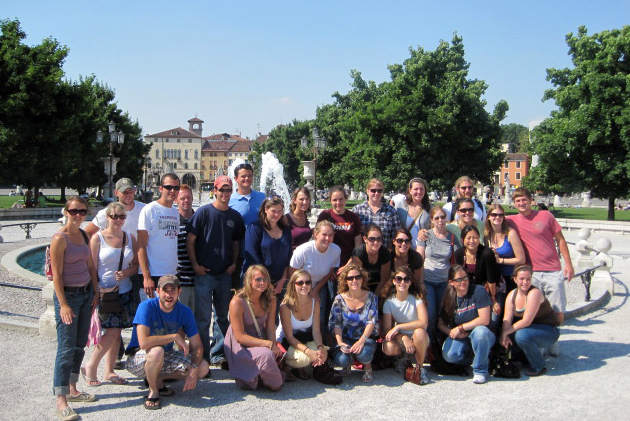Veterinary students study food systems, agricultural production in summer course in Italy

As part of the Virginia-Maryland Regional College of Veterinary Medicine’s ongoing international outreach and collaboration with other universities, Dr. Jacque Pelzer, the college's director of admissions and student services, led a group of veterinary students on a course in Italy over the summer.
This is the second year that Pelzer has led the 16-day course, Culture and Agriculture of Italy, which included 29 Virginia Tech and Oklahoma State University (OSU) students. She collaborated with Leon Spicer at OSU, who has lead eight classes to Italy in the past nine years.
The purpose of this trip, which departed in May, was to expose veterinary students to sustainable agriculture methods used in Italy, to evaluate differences in each country’s approach to veterinary education, and to compare American and Italian agricultural systems. Additionally, the students were able to take in the remains of the Roman Empire and the artistry of the Renaissance while learning about the economic and political systems in modern Italy.
The students will return to Italy during their senior year for clinical rotations.
During the course, students visited several northern Italian cities known for their agricultural traditions, including Rome, Florence, Venice, Padua, Verona, and Torino. In Pelzer’s view, by offering the course in Italy instead of the United States, students were able to learn first-hand about successful small-scale production of food, which is a very different approach from the food production methods commonly used in the United States.
For instance, in Florence, students visited the city’s massive meat and vegetable market, Mercato Centrale, where they learned about the process of production and sale. In Modena and Bologna, students visited a Parmigianoc — Reggiano (parmesan) cheese plant and dairy farm. Pelzer said that the production of the cheese was “a phenomenal undertaking,” notably because the facility’s policies and procedures were extremely complex.
In Padua, students toured the College of Agriculture at the third oldest university in Europe, which was established in 1222. In the Torino area, they toured the University of Torino School of Veterinary Medicine, where they gained a new perspective on their approaches to veterinary medicine and education.
“By studying abroad, students gain a better overall understanding of cultures other than their own,” Pelzer said. “It’s very important for students to have that exposure in order to develop global competencies and to collaborate with others on an international scale.”
To prepare for the trip, students participated in multiple lectures that introduced them to the basics of Italian history and culture. During the trip, students were required to keep a daily diary. Students were also required to become “an expert” on one of the sites the class visited, such as The Coliseum, the Roman Forum, the Pantheon, and the Vatican Museum, by giving a brief on-site presentation to the class.
Written by Rachel McDonnell of Virginia Beach, Va., a graduate student in the Department of Communication in the College of Liberal Arts and Human Sciences.







